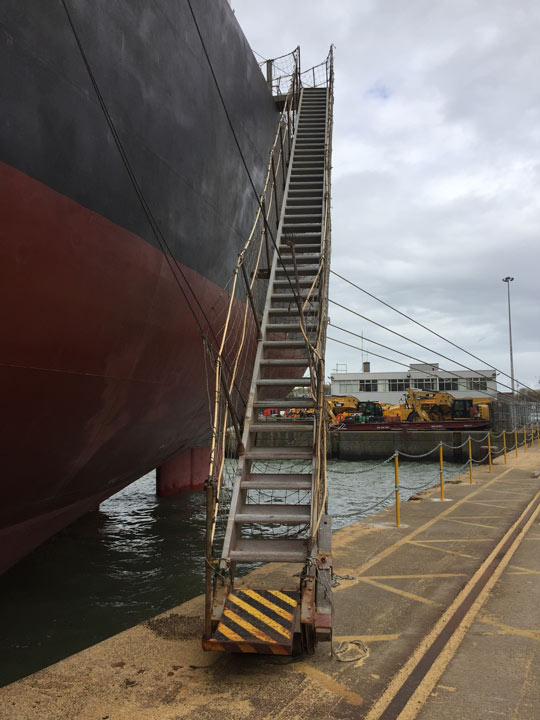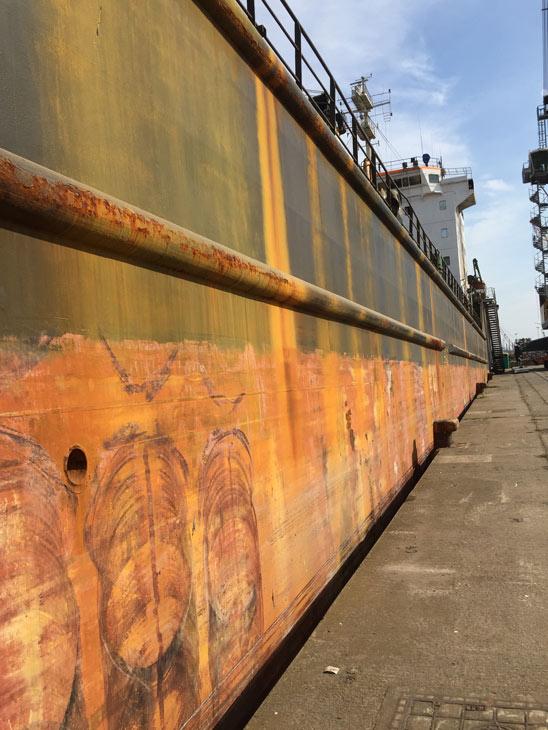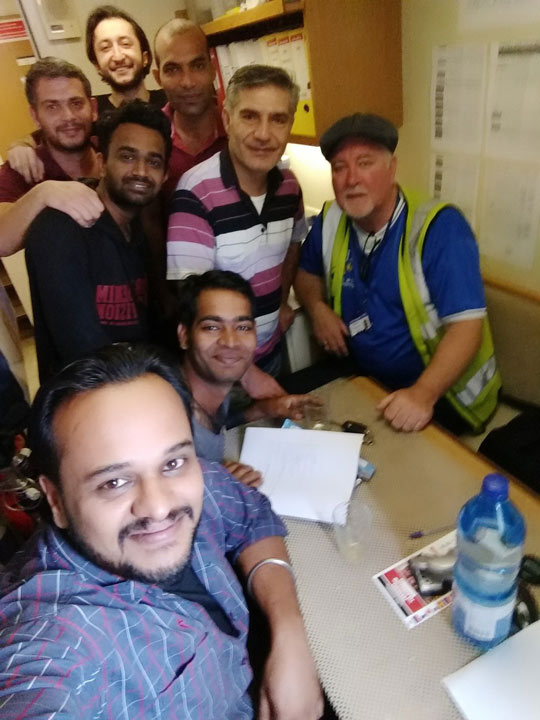Fatigued, fearful and far from home

Lead image: Tommy Molloy with seafarers, before the Covid-19 pandemic. All images courtesy of Tommy Molloy.
Have you ever been delayed at work; something crops up at the last minute and you just have to stay? Which means you miss your bus or train, or get snarled up in those traffic jams you always try to avoid. Which in turn means you’re late for dinner, or late to do the kids’ dinner, or to pick them up, or to meet a date, or for the film you’d booked tickets to go and see…
Have you ever been asked to work a double shift? Now that can really mess things up for you socially. It might add some weight to your wage packet, if you’re lucky. If it’s completely your choice that’s one thing. But if you feel you can’t say no because of promotion prospects, or peer pressure, or your performance appraisal, then that’s another thing altogether.
How much worse would it be if you simply couldn’t get out of your workplace, if all the doors were locked, the windows barred, and you were told you would have to stay indefinitely. Oh, and your employer could only afford to pay you part of your salary or none of it at all. They’d be good enough to provide you with food, if they could get it delivered, and a bed. Imagine the effect on your family, your mental wellbeing, their mental wellbeing. Surely there would be long term implications as well as short-term inconveniences.
That couldn’t happen though, could it?
Crew stuck on ships during lockdown
Except it is happening right now to more than 100,000 seafarers stuck on ships around the world, far from home long after their contracts have expired. Normally, around 100,000 seafarers per month would rotate on and off ships when their contracts expire. For European and many other Officers those contracts could typically be for a period of 2 to 6 months, sometimes longer. For Asian ratings it would typically be for a period of 9 months (plus or minus 1 month at the discretion of their employer. But it’s predominantly plus, hardly ever minus). Many thousands of seafarers have now exceeded those periods. Fatigue becomes a real problem beyond this point. Not being with your immediate family at such a time, worrying about how they are coping and yet just as worried at the prospect of contracting the virus en-route home and endangering them will also begin to affect one’s mental well-being. The combination is toxic and has great potential to threaten the safe operation of the ship.
At the outset of the Covid-19 breakout, International Transport Workers’ Federation (ITF) affiliated unions that sign the collective bargaining agreements which regulate the conditions of employment for many seafarers agreed that we would take no action against employers who, in the current circumstances, were unable to repatriate crew to their homes, so long as seafarers were issued with proper contract extensions. The reality is that with most countries in lockdown, internal and international travel restricted, severely reduced flight availability and so on, it is undoubtedly difficult for shipping companies to get crew stuck on ships relieved by crew in lock-down at home without concerted action from governments around the world to facilitate it.
Two recent examples of cases I was asked to assist with in Liverpool highlight the dilemma.

Choosing the safest option for a seafarer stuck on board a ship
The first involved a young Indonesian crew member. His contract had expired and he was due to have been relieved from Barcelona. But the ship schedule changed and it didn’t call at Barcelona. It was headed to Marseille and Liverpool after that. The crew member wrote to me to say he had written to the company to ask when he would be repatriated but had received no reply. He said his mother was ill at home and he needed to get back to her. He did not want me to contact the company on his behalf because he was fearful of the repercussions of him contacting ITF. He asked if he could be kept on board against his will.
I made enquiries of my colleagues in France and was advised that travel out of the country was sporadic at best and could not be guaranteed. I was told of one person stuck in an airport there for five days as flight after re-arranged flight was cancelled.
I discussed the matter with contacts in UK Border Force and was advised that whilst there was no formal restriction on crew leaving or joining ships in Liverpool – unlike in many other countries – they could not guarantee there would be any flights available from Manchester or Liverpool airports. There was also the danger of getting stuck in transit with no support. He could be placed in quarantine in a transit country and if he made it home he would almost certainly be placed in quarantine when he arrived. But then again, maybe not. And if he contracted the virus en route he would be endangering the mother he was trying to get back to. I discussed the possibilities and the unpredictabilities with him and he reluctantly decided that the lesser of the two evils would be to remain on the ship in relative safety. In such circumstances his mental wellbeing would be a concern.
Repatriating Chinese crew members
In the other case the Chinese crew of the Liberian flagged vessel NEW NOBLE arrived in Amsterdam in early February having been on board for 11 months. ITF intervened and it became apparent that the company had made every effort to arrange their repatriations, but because the crew came from various parts of China they would have to travel internally between provinces and such travel was banned in China. ITF Netherlands involved the Chinese Consulate and repatriation was promised in either of the next two ports, Murmansk or Casablanca. ITF Russia maintained the pressure and were assured arrangements were in place to repatriate from Morocco. When the vessel arrived in Casablanca the company claimed it was not possible to disembark the crew there due to restrictions on anyone entering or leaving the port. ITF Casablanca intervened with the authorities there and after lengthy negotiations most of the crew were repatriated and a new crew joined. Just after this the Moroccan government, like many around the world, changed their position to absolute non-authorisation of crew disembarkation.
However, the four most senior members of the crew had agreed to remain on board for handover purposes and left Casablanca with the vessel. Towards the end of March, the vessel was headed for Liverpool where there were no formal restrictions on crew changes. Pressure was applied regarding the remaining four crew members and we finally received confirmation from the local ship agent that arrangements for their repatriation were being made. When the ship arrived in Liverpool it did not tie up on the day expected and was held out at anchor for a couple of days meaning flights had to be rearranged. The ship finally came alongside and the four were taken to the airport, but they could not join their flight because of issues with the transit in Japan. They had to travel back to the port and onto the ship and wait a few more days before finally catching a flight. I subsequently received an email from the company in China advising me that the four had reached there but had been placed immediately into quarantine. Furthermore, the company had been dealing with very angry calls from family members for jeopardising the safety of the men, exposing them to the risk of contracting the virus by letting them go ashore in the UK, making them travel through crowded airports and putting them on crowded planes only to be placed into isolation for 14 days. Sometimes you just can’t do right for doing wrong.
Restrictions on seafarers across the world
But for the vast majority of seafarers currently on board ships there is no opportunity to return home.
The Indian government blocked all international crew changes for fear that seafarers would unwittingly help to spread the virus.
But they are far from the only government to have done so.
Many thousands of seafarers from The Philippines are stranded in various locations around the world but even those making it back to their country are struggling. Having managed to get flights home, hundreds are stranded in the capital, Manila. The ITF affiliated union AMOSUP are housing approximately 500 in various locations around Manila. You can read the International Seafarers’ Welfare and Assistance Network (ISWAN) report on efforts to feed them.

Protecting the rights of seafarers
Whilst it is not appropriate to lay the blame at the door of shipowners, many of whom desperately require their crews to be rotated and have been lobbying strongly for governments to facilitate, there will always be those that seek to take advantage of an already dire situation. We are aware of numerous companies changing or attempting to change existing terms and conditions of employment. We receive many requests for help from seafarers or the relatives. The following extracts are from an email appealing for us to help the crews of a number of Silversea cruise ships, in a story which was reported by the Canadian media.
"The Silver Cloud is docking today in Southampton port, with crew who's been onboard for over 70 days at sea.
Crew onboard told us that they have not been paid since 15 April (and this pay was 50% of their salaries).
The company did not give them a choice, they said the crew had to sign new contracts for 0% pay and if they did not sign, then they have to make their own way home. Pay for own flights, company will not pay for flights......Crew on the Silver Explorer have been onboard for over 40 days.
Crew have been told that they have to wait in Panama till 23 May when the airport from Panama might open up. But that doesnt mean that there will be flights out for crew, from Panama on 23 May.
Silversea does not want to move the ships Muse or Explorer to other countries where crew could find flights to fly home, as these ships are scheduled to cruise from the Pacific side in July......Silver Explorer did have sick guests onboard, who tested positive for Covid19.
All crew have now been sick onboard and tested positive for Covid19.
Silversea jeopardized all crew's health, onboard this ship."
Sadly, this story can be replicated many times over. It makes mainstream media news when passengers are involved. But most of shipping does not involve passengers.
The dangers brought on board by visitors
We also have seafarers contacting us asking if we can stop visitors coming on board as they are fearful of contracting the virus from them. Dockers and Pilots must go on but given the current situation almost everyone else is superfluous, apart from in an emergency. I read one article recently extolling the virtues of the self-proclaimed last ship welfare visitor in Rotterdam. He believed the seafarers needed to see him more than they needed to be protected from the virus. He wouldn’t wear a mask as he also believed “…the crew deserve to see my face”.
The following is from an article 'Health hazards from onshore' published by Al Jazeera:
Some seafarers with expired contracts have had little choice but to accept the extension. Stanislaw, a 36-year-old officer from Poland who asked not to be identified by his real name, was ready to head home to his wife and young daughter this week, but he is now in Colombia, loading up a bulk carrier with coal, which will be unloaded in Guatemala.
Speaking to Al Jazeera over the phone from onboard, Stanislaw said he preferred to remain at sea rather than risk infection on the journey home. "I would have to cross through airports, where there is a lot of risk. I don't want to bring any hazard home."While he and his crew are currently free of infection, Stanislaw fears transmission by dockworkers and port pilots who come aboard during loading and discharging. At Rio Haina in the Dominican Republic, although port officials requested his ship be thoroughly sanitised before docking, the surveyors who boarded to inspect the ship were not sufficiently equipped with gloves and masks.
"They were touching everything. What's the point?" asked Stanislaw.
"They ask us to keep the ship to 'hospital standard,' but nobody protects us from their stupidity. We're not the hazard for them; they're the hazard for us."
A petition was recently started by a family member concerned about the risk to seafarers of exposure in ports. It calls for a zero-contact policy. Given the nature of the business that would not be easy to achieve. But it’s easy to understand the concern.
Key workers
Towards the end of March, following intense lobbying by several maritime organisations including ITF, Nautilus International, the International Chamber of Shipping and the UK Chamber of Shipping, the UK government became the first to designate seafarers as “key workers”. Approximately 90% of everything we use comes to us by sea. It is vital that this supply chain, which can only function with the efforts of seafarers, is given every assistance to continue as smoothly and as safely as possible.
Several other countries have followed suit. India has finally agreed recently to allow Indian seafarers stranded on ships in its ports, or at anchorage outside its ports, to be relieved by seafarers confined to their homes during the lock-down. Strict procedures will have to be adhered to, but it is a positive move.
The lobbying continues on an international front with such organisations as those already referenced, along with ILO, IMO, WHO continuing to press governments to assist with processes to aid safe crew changes in order to maintain the trade that enables our economies to function.
Ship inspections during the pandemic

Like most ITF Inspectors around the globe, I am required to comply with government social distancing requirements. I am not considered a key worker. So I am unable and frankly unwilling to inspect ships and jeopardise both crew on board and my family and community during this period. Last year ITF’s 135 Inspectors worldwide carried out 10,243 ship inspections and recovered USD43.6 million in unpaid wages for seafarers. That was before this pandemic had been unleashed.
We are very aware that along with millions of other workers around the world many seafarers will pay a heavy price. Many companies will claim they simply cannot pay crew wages. Many will be left abandoned on ships that owners will walk away from. Many will languish for many months on ships with no fuel and no power, being fed by charity if they are lucky, hoping that their ship can eventually be sold – even for scrap – so that ITF can recover their wages for them. So that they can eventually return home to their families after this long day’s night.
Spare a thought for seafarers
We are not alone in thinking we are about to be as busy as we have ever been. Ships are registered by their owners in the likes of Panama, Liberia, Belize, Cook Islands, Honduras, Vanuatu, and so on precisely because there is very little by way of social provision that they have to comply with. No furlough schemes there. No redundancy, no unemployment benefit. I don’t have to go on.
All of which makes missing the bus home because you worked late a little more palatable. Nonetheless, I hope you don’t get delayed beyond your expected finishing time and that if you are continuing to work for the benefit of the rest of us during this period I thank you and hope you and your loved ones remain safe and well. Please keep a good thought for the seafarers who keep us supplied and if you feel it, please share their plight and your indignation.
